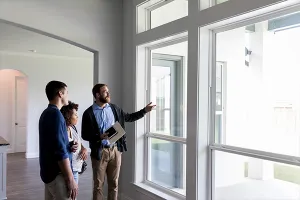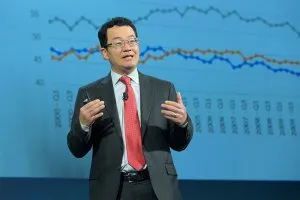As co-founder of a real estate organization that has grown over more than forty years from a single office in Denver into a global empire that today counts more than 100,000 agents, RE/MAX Chairman and Co-CEO Dave Liniger enjoys a unique view of the housing industry.
Among his observations is that despite the advances in technology that have swept the business world over the past half-century, the essence of the real estate industry has remained the same: It’s all about people.
RE/MAX co-founder Dave Liniger, left, speaks with TV host Wayne Brady, right, at the 2017 RE/MAX R4 convention in Las Vegas

“There’s nothing like being an old man in an old industry pontificating,” says Liniger. “But it’s fun to see it from my eyes … to have seen all the changes and all the people that said they were going to change your industry and all the things that were going to revolutionize the industry. The end result is it’s still a personal relationship between a real estate agent and a customer.”
But while the fundamental role agents play may not have changed, Liniger says the housing market is undergoing a shift unlike anything he has seen in his career because homeowners have become accustomed to rock-bottom mortgage rates and builders are not building enough homes to meet demand. These factors have caused many people to shy away from selling their homes and moving up, crimping the availability of less-expensive homes for other buyers, he says.
To deal with the inventory crunch, Liniger, who spoke during an interview in his office at RE/MAX’s headquarters in Denver, advises real estate professionals to find creative ways to find homes for clients to buy. Patience is also essential, he says.
“You can’t create new homes, but you can create resales, says Liniger, who founded RE/MAX in 1973 with his wife, Gail. “And so the agents have to work their previous customers, let them know that they can move up, let them know that it is a good market to sell. But most of it is just time … it’s going to be OK, and it will work its way out.”
Even if new construction picks up, people who are trying to enter the housing market are generally better off buying an existing property than a freshly built home, Liniger says.
“The problem with brand new is it’s shiny and it’s very pretty, but you’ve got to pay for the landscaping, and you’ve got to put in the plants, and you’ve got to put up the drapes, and you’ve got to do all this stuff that stretches a first-time buyer,” he says. “You know a first-time buyer is struggling to get the down payment, let alone come in and add $10,000 or $20,000 more to making the house livable. And so for first time buyers, resale is a much better deal.”








